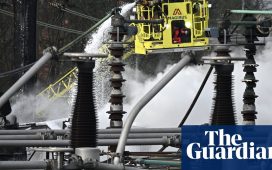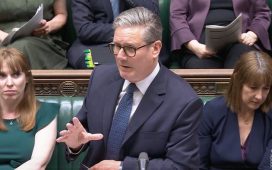Thames Water criticised as profits and pollution both rise
Thames Water has been criticised for allegedly prioritising investors over pollution, after profits and the number of pollution incidents both rose.
The company on Tuesday said that higher rainfall had increased the number of “pollutions” in the year to March 2024 by 6% to 350, compared to 331 in the previous year.
James Wallace, chief executive of River Action, which campaigns against pollution, said:
There is nothing to cheer as this failing water company, the largest in Europe, continues to desperately prioritise the interests of investors and lenders before the health of rivers and river users.
As we found recently on the stretch of the Thames used for the Henley Royal Regatta, leaking infrastructure managed by Thames Water leads to dangerously high levels of human sewage entering rivers in their catchment on a daily basis.
With a newly elected Labour government promising to clean up our rivers and seas, it is time for urgent action to tackle the freshwater emergency, partly caused by polluting water companies. A good first start would be for the government to properly resource the environmental regulators such as the Environment Agency in England to ensure they can police and prosecute polluters.
Susannah Streeter, head of money and markets at Hargreaves Lansdown, an investment platform, said that Thames Water’s money “reservoir” was shrinking.
It can still tap funding of around £1.8 billion, until spring next year but it’s a reservoir that’s been shrinking. At the same time, its debt pile is an even bigger millstone and risks pulling the business under.
For now, the company is treading water, but it’s been in a more precarious position after shareholders at the parent company Kemble Water held off from injecting cash into the business over a row with the regulator Ofwat regarding how high bills could be put up by 2030 to enable it to pay for critical repairs.
Key events
BP shares fall after oil company predicts lower profits and oil production
BP is the biggest faller on the FTSE 100 today after it said that it will produce less oil than expected and refinery profits will drop by as much as $700m.
Shares in the oil supermajor fell by 4% after it warned that the fall in output and declining profits from its refineries would hurt second-quarter profits.
Its oil trading performance will also be “weak” compared with a strong first quarter.
The warning will be a blow to chief executive Murray Auchincloss’s hopes to persuade investors that it can close a valuation gap with US rivals. Auchincloss last month froze hiring on offshore wind projects to try to placate investors who are apparently concerned about the company’s green targets. Although BP officially recognises the climate crisis and the need to shift to zero emissions, Auchincloss has slowed its transition away from fossil fuels.
BP will also have a charge of up to $2bn as it reviews the future of its refinery in Gelsenkirchen, Germany.
Reuters reported that analysts cut profit forecasts:
Citi analysts lowered their Q2 earnings per share estimate by 9% while Jefferies analysts expected the update to result in a 20% earnings downgrade.

Sandra Laville
Sewage pollution from ageing Thames Water treatment works that have not been upgraded increased last year, causing the company to again fail to meet its legal targets, according to its financial report.
Across the Thames Water area, the number of incidents of pollution from treatment works and the pipe network increased to 350, compared with 331 in 2022. The rise was attributed to delays in investment to create more capacity at many of the company’s 400 ageing sewage treatment works. Chris Weston, Thames Water’s chief executive, said the works could not cope with a 40% increase in rainfall and exceptionally high levels of groundwater.
Asked why Thames had failed for many years to invest in upgrading treatment works, Weston repeated that the works were “old”. He said: “They require a lot of development, a lot of investment into things like putting in storm tanks. All of that takes time and requires a lot of investment on top of what we have done already.”
The company said there had been a “significant increase in sewage treatment works pollutions” in the year, caused by delays to pollution improvement engineering programmes, as well as the installation of more monitoring at works.
You can read the full report here:
The Liberal Democrats – buoyant after their surge in seats at the general election – have described Thames Water as a “rogue firm”, and called for blocks on dividends or bill hikes from the company.
Thames Water has long argued that it needs to raise bills in order to pay for investments to upgrade its creaking pipes.
However, the Lib Dems found the UK’s polluted waterways to be a strong campaign issue. Many of its election gains also happen to map onto areas supplied by Thames Water – notably the affluent towns up the Thames and into Oxfordshire.
Sarah Olney, the Lib Dem Treasury spokesperson whose Richmond Park constituency is bordered by the Thames, said:
This is a complete mess and it’s time the regulator started blocking Thames Water’s planned dividend payouts and eye-watering bill hikes.
Years of inaction from Conservative Ministers has lead to these bill increases and firms getting away with endless sewage dumps and insulting bonuses.
It is clear the public want action to be taken to finally crackdown on this rogue firm. The government and regulator should listen to this call.
The idea of nationalisation of the UK’s water supply did not seem to be on the cards during the 14 years of Conservative rule (although in the case of the railways the party did relax its apparent aversion to public ownership). But could a Labour government be more open to it?
The party has firmly said that it is not planning to nationalise the company. Business secretary Jonathan Reynolds last month told an election debate that “people should not expect the state to bail out bad investments”.
Its hand may be forced if the water company cannot find investors, but some campaigners think nationalisation would be a better deal for taxpayers (as long as shareholders are not bailed out).
Matthew Topham, lead campaigner at public ownership campaign group We Own It, said:
Today’s latest crisis is being used to set the scene for the same old story that we’ve come to expect from water privatisation: shareholders mismanage a vital public service and who do they expect to pick up the tab? Households, taxpayers, and our waterways.
Water privatisation may have lined overseas shareholders’ pockets, but it failed to deliver for the public or for our rivers and seas. It’s high time that this government takes Thames Water into Special Administration and then transfers it to local councils to run, giving anti-sewage campaigners, local residents, and water experts seats on its board.
The public shouldn’t lose twice. Reckless shareholders and creditors should be paying the price for their failure. As Thames Water circles the drain, we have a unique opportunity to join nearly every other country in the world and run our water not for private profit, but for the people of this country who rely on it.
Rachel Reeves summons City bosses for £7.3bn wealth fund launch

Kalyeena Makortoff
The new chancellor Rachel Reeves is summoning City bosses to Whitehall, as she prepares to launch a promised £7.3bn national wealth fund.
Labour has been crafting the fund for months, having appointed a taskforce involving top financial figures, including former Bank of England governor Mark Carney and
Barclays boss CS Venkatakrishnan, to hash out details of an important manifesto pledge.
Aviva chief executive Amanda Blanc is among the taskforce members due to gather at the chancellor’s office at Number 11 Downing Street at midday to launch the fund, which is meant to attract £3 of private funds for every £1 of public cash, in a bid to accelerate investment in key infrastructure projects up and down the UK.
Those projects are expected to include ports, gigafactories for electric car batteries, carbon capture and hydrogen projects and steel operations
The chief executives of the UK Infrastructure Bank and British Business Bank has also been invited, as both institutions are set to play a key role in the fund, which would otherwise overlap with some of their operations. An announcement is expected in the early afternoon.
Members of Labour’s national wealth fund taskforce included:
-
Chair: Rhian-Mari Thomas, chief executive of the Green Finance Institute
-
Mark Carney, former governor of the Bank of England
-
Amanda Blanc, chief executive Aviva
-
CS Venkat, chief executive Barclays
-
Hugh Crossley, chief executive of Equitix
-
David Vickers, chief investment officer of Brunel Pension
-
Carol Young, chief executive of USS, the university superannuation scheme
Thames Water criticised as profits and pollution both rise
Thames Water has been criticised for allegedly prioritising investors over pollution, after profits and the number of pollution incidents both rose.
The company on Tuesday said that higher rainfall had increased the number of “pollutions” in the year to March 2024 by 6% to 350, compared to 331 in the previous year.
James Wallace, chief executive of River Action, which campaigns against pollution, said:
There is nothing to cheer as this failing water company, the largest in Europe, continues to desperately prioritise the interests of investors and lenders before the health of rivers and river users.
As we found recently on the stretch of the Thames used for the Henley Royal Regatta, leaking infrastructure managed by Thames Water leads to dangerously high levels of human sewage entering rivers in their catchment on a daily basis.
With a newly elected Labour government promising to clean up our rivers and seas, it is time for urgent action to tackle the freshwater emergency, partly caused by polluting water companies. A good first start would be for the government to properly resource the environmental regulators such as the Environment Agency in England to ensure they can police and prosecute polluters.
Susannah Streeter, head of money and markets at Hargreaves Lansdown, an investment platform, said that Thames Water’s money “reservoir” was shrinking.
It can still tap funding of around £1.8 billion, until spring next year but it’s a reservoir that’s been shrinking. At the same time, its debt pile is an even bigger millstone and risks pulling the business under.
For now, the company is treading water, but it’s been in a more precarious position after shareholders at the parent company Kemble Water held off from injecting cash into the business over a row with the regulator Ofwat regarding how high bills could be put up by 2030 to enable it to pay for critical repairs.

Alex Lawson
Thames Water has £15.2bn of debt, up £1.3bn on the previous year, the bulk of which could be added to the public purse if the government stepped in to renationalise the troubled company.
The Guardian revealed in April a contingency plan, codenamed Project Timber, was being drawn up in Whitehall to renationalise Britain’s biggest water company if it collapses.
Thames said it was “reasonable” to assume it would have sufficient resources to continue operating until at least April 2025, but there were “material uncertainties”. These included not securing commitments for future funding, a downgrade to its credit rating or a failure to meet its legal obligations.
On Thursday, Ofwat will give its first view on five-year business plans submitted by English and Welsh water companies, including Thames, last year.
You can read the full story here:
Shares in Indivior plunge after profit warning and drug abandonment
Indivior, which makes the opioid addiction treatments Suboxone and Sublocade, has issued a profit warning and said it would cut 130 jobs as it stops selling its schizophrenia treatment Perseris.
The news sent its share price plummeting by 36% to their lowest since the summer of 2021. The shares at £7.30 are down 63% from their peak above £20 in early 2023.
Mark Crossley, the chief executive, said the company was reducing its full-year guidance partly because the end of Covid-19 emergency measures related to automatic Medicaid coverage renewals in the US had impacted its Sublocade revenues more than expected.
Indivior, which has been exploring whether to move its main share listing from London to New York, now expects to make an adjusted operating profit of between $285m and £320m this year, down from $330m to $380m forecast in May.
However, Crossley remains confident that Sublocade’s “unique profile to address high-powered synthetic opioids, such as fentanyl, provides us with a tremendous opportunity to meet the growing and changing needs of patients”.
As a result, the company expects Sublocade, an injected prescription medicine that treats moderate to severe opioid use disorder, to hit net revenues of $1bn “as we exit 2025,” and to achieve peak annual revenues of more than $1.5bn.
Indivior said:
The group remains confident that given the scale of the US opioid epidemic, which is now being driven by misuse of fentanyl and other synthetic opioids, its opportunity to help patients and deliver value for shareholders remains intact.
The company is ceasing all sales and marketing of Perseris immediately due o the “highly competitive market” and payor changes in the US. It will continue to supply Perseris “for the forseeable future” to avoid disruption to patient care but will no longer have a dedicated salesforce, resulting in 130 job losses. The changes are expected to result in charges of $65m.
Indivior said it had reached an $85m settlement with health Care Service of Florida, Blue Cross Blue Shield of Massachusetts and others to resolve anti-trust litigation in Roanoke County Circuit Court in Virgina, pending since 2020.
Last year, Indivior, and its former parent company, the consumer goods group Reckitt Benckiser, from which it was spun off in 2014, faced a lawsuit in London’s high court over allegedly false marketing of Suboxone, but the case was thrown out in December.
The US justice department in 2019 charged Indivior with fraudulently claiming Suboxone film was better and safer than similar drugs. Reckitt agreed to pay a $1.4bn fine to settle the case in July 2019, without any admission of wrongdoing, while Indivior said in 2020 that it had “pleaded guilty to one count of making a false statement relating to healthcare matters in 2012” and that it would “make payments to federal and state authorities totalling $600m over a period of seven years”.
Shaun Thaxter, the former Indivior chief executive, was sentenced to six months in federal prison in 2020 after pleading guilty to his role in a scheme to secure Medicaid coverage for Suboxone film by misleading officials about its dangers to children.
Thaxter was replaced by Crossley, the former chief financial and operations officer, who has worked at the company since 2017.
Thames Water ‘pollutions’ increase 6%
Thames Water’s financial situation is shocking, but its political impact has partly been caused by the disgusting facts of what happens when things go wrong: raw sewage flowing into the UK’s rivers.
The company on Tuesday said that the number of “pollutions” in the year to March 2024 had increased to 350, compared to 331 in the previous year. That is a 6% increase.
Thames Water said that was “driven by a 40% increase in average rainfall” and that “The number of serious pollutions decreased by 18%”.
Responding to Thames Water’s annual results, Paul de Zylva, senior sustainability analyst at Friends of the Earth, an environmental campaign group, said:
Water companies have had free license to line their shareholders’ pockets handsomely for decades while letting our rivers and seas fill with sewage and infrastructure crumble. Failed regulation has allowed Thames Water’s past and present owners to extract money, and to burden the company with debts running at over £19bn.
It’s staggering that the company is still counting on weak regulation to allow it to survive by pushing its problems onto its customers – asking Ofwat to allow it increase bills by a shocking 59%. This means bill payers being left to subsidise what little it’s prepared to invest towards fixing the pollution and sewage scandal.
The regulator must end this license for water companies to profit from pollution, while wildlife and our health is put at risk. Proper regulation means Ofwat must make Thames Water and other water companies pay for the clean-up needed without passing on higher bills to us. It also means proper fines for polluting and an end to water bosses getting high pay and bonuses for failure.
Vistry Group says it will increase housebuilding this year

Julia Kollewe
Vistry Group, the house builder formerly known as Boris Homes, expects to build more than 18,000 homes this year, up nearly 12% from last year, as it prepares to work with Keir Starmer’s government to tackle the UK’s housing crisis.
Greg Fitzgerald, the chief executive, said:
We look forward to working with the new government to address the country’s housing crisis and are extremely well placed to support its ambition of delivering the biggest boost to affordable housing in a generation.
Housebuilding shares jumped on news of the landslide Labour victory last Friday, as the party has pledged to tackle planning issues and build 1.5m homes in the next five years.
Vistry expects to make an adjusted profit before tax of £186m in the first six months of the year, up 7%, with completions rising by 8% to 7,750 homes. It sad it had benefited from lower building material costs compared with last year.
Vistry’s share price rose by 0.6%.
The Kent-based company works with local authorities, housing associations and private rental firms to deliver affordable housing. Those partnerships are set to fund 75% of all completions this year. Vistry has seen a pick-up in demand from the private rented sector, while traditional registered providers of social housing are currently focusing on maintenance and remediation of existing housing, particularly in London.
In May, Vistry sold a further 1,750 homes to the private rental company Leaf Living, which was set up in 2021 by Regis and the US fund manager Blackstone. Most of the homes are expected to complete within the next couple of years.
RBC Capital Markets analyst Anthony Codling said:
The election of Labour is good news for Vistry. With its focus on build rates and partnership homes, it is likely to become the teacher’s pet of the Labour government. Working closely with local authorities could provide a win-win, helping councils meet their housing needs, the government its housing targets, and delivering more choice to renters and homebuyers.
Investec’s housing analyst Aynsley Lammin concurred, saying:
The partnerships model continues to underpin a relatively strong performance against a weak private open market … The open market still looks constrained, but with some positive momentum and firm pricing with sales incentives continuing.
London’s benchmark stock index has not followed Tokyo’s lead: the FTSE 100 has dropped 0.1% at the opening bell.
Perhaps London’s lack of chip companies or tech stocks might have something to do with that… although the rest of Europe is no different.
Here are the rest of the opening snaps, via Reuters, from across Europe:
-
EUROPE’S STOXX 600 DOWN 0.2%
-
GERMANY’S DAX DOWN 0.3%
-
FRANCE’S CAC 40 DOWN 0.3%, SPAIN’S IBEX DOWN 0.4%
-
EURO STOXX INDEX DOWN 0.3%; EURO ZONE BLUE CHIPS DOWN 0.3%
Thames Water has cash to survive ‘to May 2025’; Japan’s Nikkei rises 2% to new record
Good morning, and welcome to our live, rolling coverage of business, economics and financial markets.
Thames Water has said that it has enough cash to keep it going until May 2025, as potential investors await the outcome of negotiation with the UK regulator.
The company, which provides water to London and the Thames Valley in the south-east of England, is in a parlous financial state. Keir Starmer, the new prime minister, and Rachel Reeves, the new chancellor, have been briefed that the company presents a “critical risk” to the country.
Thames Water Utilities Limited, the regulated subsidiary, on Tuesday said it had £1.8bn in cash and other liquid assets “sufficient to fund our operations for the next 11 months to the end of May 2025”.
Following the draft determination and our response to Ofwat we will be engaging with potential investors and creditors to seek new equity and to extend our liquidity runway. Any equity process is not expected to conclude until after the final determination.
The company reported a 10% increase in revenues to £2.4bn in the year to 31 March as it raised bills in line with inflation, and scraped to a profit of £75m. It also said that it spent a record £2.1bn as it maintained and upgraded its ageing pipe network.
Chris Weston, chief executive of Thames Water since December, said he believed the business could be turned around. He said:
The challenges we face are well documented, but our operational and financial performance for the last year show good progress, and these positive results provide the right foundations on which to build and improve.
Japan’s Nikkei index hits new record
Japan’s benchmark Nikkei 225 index closed at a new record high on Tuesday, the latest in a series of records amid a global surge in investor interest in artificial intelligence companies.
Computer chip semiconductor companies – who have been some of the biggest beneficiaries of the rally – helped the index to a 2% gain on Tuesday, outpacing other Asian stock indices.
The index closed at a record high of 41,580.17 on Tuesday, after rising as high as 41,769.35 during afternoon trading.
The Nikkei had taken decades to surpass its previous peak, hit during the 1989 bubble. On the final trading day of 1989, it had closed at 38,915.87; that level was reached again in February, 34 years later.










